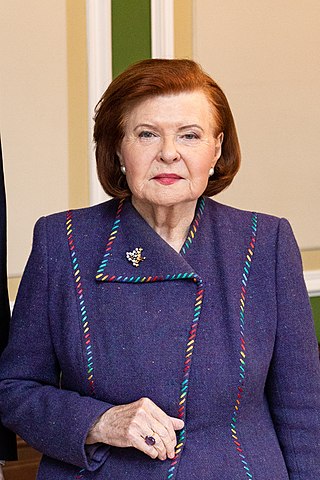
The International Institute for Strategic Studies (IISS) is an international research institute or think tank focusing on defence and security issues. Since 1997, its headquarters have been at Arundel House in London. It has offices on four continents, producing data and research on questions of defence, security and global affairs, publishing publications and online analysis, and convening major security summits. The Guardian newspaper has described the IISS as ‘one of the world’s leading security think tanks.’

The Trilateral Commission is a nongovernmental international organization aimed at fostering closer cooperation between Japan, Western Europe and North America. It was founded in July 1973, principally by American banker and philanthropist David Rockefeller, an internationalist who sought to address the challenges posed by the growing economic and political interdependence between the U.S. and its allies in North America, Western Europe, and Japan. The leadership of the organization has since focused on returning to "our roots as a group of countries sharing common values and a commitment to the rule of law, open economies and societies, and democratic principles".

Vaira Vike-Freiberga is a Latvian politician who served as the sixth President of Latvia from 1999 to 2007. She is the first and to date only woman to hold the post. She was elected President of Latvia in 1999 and re-elected for the second term in 2003.
The Stefan Batory Foundation is an independent Polish non-government organization established by American financier and philanthropist, George Soros, along with a group of Polish opposition leaders of 1980s, and registered in Poland since May 1988. It is named after Stephen Báthory, the 16th-century Polish king. The foundation's mission is to support the development of an open, democratic society in Poland along with other Central and East European countries.

The Rose Revolution or Revolution of Roses was a nonviolent change of power that occurred in Georgia in November 2003. The event was brought about by widespread protests over the disputed parliamentary elections and culminated in the resignation of President Eduard Shevardnadze, which marked the end of the Soviet era leadership in the country. The revolution derives its name from the climactic moment, when demonstrators led by Mikheil Saakashvili stormed the Parliament session with red roses in hand.

The European People's Party (EPP) is a European political party with Christian democratic, liberal-conservative, and conservative member parties. A transnational organisation, it is composed of other political parties. Founded by primarily Christian-democratic parties in 1976, it has since broadened its membership to include liberal-conservative parties and parties with other centre-right political perspectives. On 31 May 2022, the party elected as its President Manfred Weber, who was also EPP's Spitzenkandidat in 2019.

The School of Advanced International Studies (SAIS) is a graduate school of Johns Hopkins University based in Washington, D.C. The school also maintains campuses in Bologna, Italy and Nanjing, China.

Stavros Lambrinidis is a Greek lawyer and politician, currently serving as Ambassador of the European Union to the United Nations. He was previously Ambassador of the European Union to the United States from March 2019 until December 2023, European Union special representative for human rights from 2012 to 2019 and Minister for Foreign Affairs in Greece from June 2011 to November 2011.

The School of International and Public Affairs (SIPA) is the international affairs and public policy school of Columbia University, a private Ivy League university located in Morningside Heights, Manhattan, New York City. SIPA offers Master of International Affairs (MIA) and Master of Public Administration (MPA) degrees in a range of fields, as well as the Executive MPA and PhD program in Sustainable Development.

Kinga Göncz is a Hungarian academic and the former Minister of Foreign Affairs of Hungary between 2006 and 2009. In 2009 she headed the Hungarian Socialist Party (MSZP) European election list and was subsequently elected as one of 22 Hungarian Members of the European Parliament (MEPs).

Alexander "Kakha" Lomaia is a Georgian politician, diplomat and statesman, serving as Permanent Representative of Georgia to the United Nations from January 2009 to October 2012. As a Permanent Representative, Lomaia established diplomatic relationships with over 50 countries. His prior appointments in the government of Georgia included Minister of Education and Science and Secretary of the National Security Council of Georgia.
István Teplán is a Hungarian economic historian, sociologist and educator, graduated from Harvard IEM in 1999. He is one of the creators of the first international Western-style graduate school in the post-communist Central Europe.

Andrei Popov is a Moldovan diplomat, journalist and civic activist. He is the current Moldovan Ambassador to Greece and Cyprus.

The DiploFoundation is a non-profit organisation based in Malta, with offices in Geneva, Belgrade and Washington, D.C.

Mátyás Eörsi is a Hungarian politician who was the leader of the liberal Alliance of Liberals and Democrats for Europe in the Parliamentary Assembly of the Council of Europe (ALDE-PACE) Group in the Parliamentary Assembly of the Council of Europe (PACE). He became a member of the PACE in 1994. On 6 March 2009 the Hungarian government nominated Eörsi to Secretary General of the Council of Europe.

The Foreign Affairs Policy Board is an advisory board that provides independent advice and opinion to the secretary of state, the deputy secretary of state, and the director of policy planning on matters concerning U.S. foreign policy. The board reviews and assesses global threats and opportunities, trends that implicate core national security interests, tools and capacities of the civilian foreign affairs agencies, and priorities and strategic frameworks for U.S. foreign policy. The board meets in a plenary session several times a year at the U.S. Department of State in the Harry S. Truman Building.
The Paris Peace Forum is a French non-profit organisation created in March 2018. The organisation hosts an annual gathering of world leaders and heads of international organisations, as well as leaders from civil society and private sectors and thousands of individuals from around the globe, on creating forms of collective action. The Paris Peace Forum completes the existing world agenda of multilateral gatherings by creating a specific event for global governance issues, as economic and financial issues are dealt at the World Economic Forum in Davos, and security issues at the Munich Security Conference.















